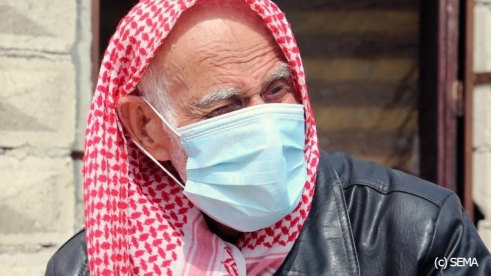The resolution adopted by Member States at the World Health Assembly shows an important recognition of the impact of COVID-19 on older people but does not go far enough in guiding a targeted response.

Member States called for access to safe testing, treatment, and palliative care for COVID-19, with particular attention to older people, in a resolution that was unanimously adopted.
“Today’s resolution demonstrates increased recognition among Member States of the disproportionate impact of COVID-19 on older people around the world and the urgency to respond” said Justin Derbyshire, Chief Executive of HelpAge International.
“I am encouraged that Member States specifically called for particular attention to older people when it comes to access to safe testing, treatment, and palliative care for COVID-19. I urge Member States to follow through on this important commitment. We need action not just words – health systems must deliver COVID-19 and other vital services, protecting older people’s right to health.”
For the first time in its history the World Health Organization convened a virtual World Health Assembly (WHA) on 18-19 May 2020, at which Member States adopted the resolution on the global response to the COVID-19 pandemic. The resolution, led by the European Union, recognised the need to protect older people and the potential risk of disruptions in their care.
Interventions were made to the Assembly by Heads of State, Ministers of Health and other government representatives highlighting the situation in their countries and how the global community must respond.
“Despite the adoption of the resolution, the statements made to the Assembly were very disappointing. The impact of the pandemic on older people was notable by its absence,” said Rachel Albone, Global Health and Care Adviser for HelpAge International.
“Only a handful of more than 150 statements referred to older people and the risks they face. This lack of attention calls to mind ageist reactions to the pandemic observed by HelpAge, our network members and older people around the world, in which older people have been systematically excluded. While we welcome the resolution on COVID-19, the exclusion of the issues faced by older people from WHA statements, clearly shows they are not a priority for Member States.”
The lack of access for civil society to the WHA was also a concern. Organisations in official relations with WHO were restricted to written statements, with no opportunity to speak to the Assembly and to hold Member States and WHO to account.
“The restrictions on civil society at the World Health Assembly are not the first we have seen since the COVID-19 pandemic began,” said Justin Derbyshire. “The Commission on the Status of Women provided even less space for NGOs. COVID-19 cannot be used as an excuse to diminish the voice of civil society and the people we represent. These are people who, as the WHA has shown, have no voice in global processes if civil society cannot speak.”
